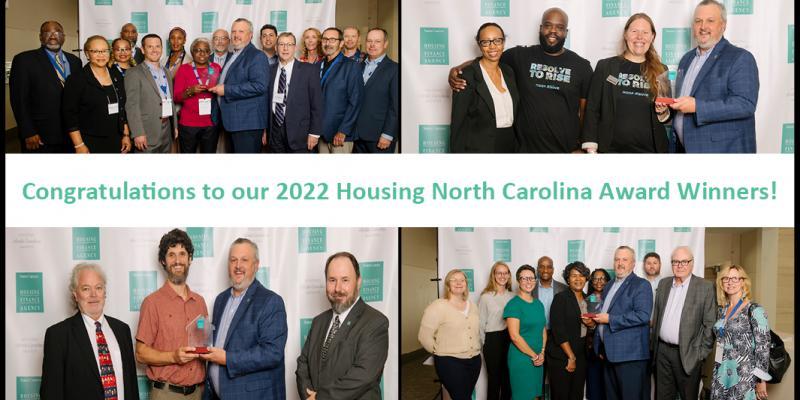
RALEIGH—Three developments and one organization have been honored with North Carolina’s top awards for excellence in affordable housing. This year’s Housing North Carolina Award winners provide opportunities for home buyers, life-changing repairs and modifications for homeowners, affordable apartment homes for working families and supportive housing for men experiencing homelessness.
In its 33rd year, the 2022 Housing North Carolina Awards are recognizing affordable housing accomplishments in Durham, Charlotte, Raleigh and Madison County. Awards were presented by the North Carolina Housing Finance Agency during a luncheon at the 2022 NC Affordable Housing Conference. This year’s awardees are:
- Willard Street Apartments, Durham, an affordable mixed-use apartment community for working families at many income levels.
- Howard Levine Men’s Shelter, Charlotte, a supportive housing development striving to help Charlotte citizens transition from homelessness to home.
- East College Park, Raleigh, a new mixed-income community providing home ownership opportunities for local residents.
- Community Housing Coalition of Madison County, an organization that provides home rehabilitation, repairs and accessibility modifications for low-income homeowners.
Editor: A description of each winner and the contact person follows:
Willard Street Apartments, Durham
Completed in 2021, Willard Street Apartments turned a formerly vacant lot into a mixed-use development to help address housing affordability issues in Durham. Located in the heart of downtown, 82 apartment homes will serve residents earning between 30–60% of the area median income and 25% of the units are available to residents making less than 30% of the area median income. Willard Street Apartments is the first affordable housing development in decades to be developed in the downtown area.
Developed by DHIC, Inc. and Self-Help Ventures Fund, Willard Street Apartments received strong community support. Residents enjoy close proximity to local and regional bus routes, Amtrak, greenways and a variety of shopping, dining, social services and employment opportunities, as well as an array of interior and exterior amenities like a fitness room and playground.
Willard Street Apartments was financed with Low-Income Housing Tax Credits awarded by the NC Housing Finance Agency.
Contact: Michael Rodgers, director of real estate business development, DHIC, Inc., 919-600-5365
Howard Levine Men’s Shelter, Charlotte
The Howard Levine Men’s Shelter was developed by Roof Above, formerly Urban Ministry Center and Men’s Shelter of Charlotte, with a mission to end homelessness one life at a time by providing a continuum of services to people experiencing homelessness. These services include street outreach, a day services center, emergency shelter, employment and medical support, outpatient substance abuse treatment and short-term and long-term supportive housing.
The Howard Levine Men’s Shelter offers 164 beds and several significant space improvements, including sleeping pods to increase privacy, dignity and safety; a full kitchen with on-site refrigeration and storage; on-site laundry services; a learning lab to provide access to computers to support employment, housing and learning goals; staff offices; heated storage for pest prevention; and a durable design that includes heavy-duty sheetrock, bed-bug resistant bedding and easy-to-clean surfaces.
Financing for the Howard Levine Men’s Shelter was provided by the NC Housing Trust Fund.
Contact: Melinda Wilshire, director of communications, Roof Above, 704-334-3187 ext. 1060
East College Park, Raleigh
Amongst a population boom and limited land availability, the City of Raleigh began the East College Park project in 2017 to moderate residential home values and increase home ownership opportunities for local residents with lower incomes in an historic neighborhood, with the added goal of encouraging community diversity. Once federal and local funds were used to purchase 25 acres of land and upgrades to public and private infrastructure was in place, the city facilitated the construction of 98 single-family homes to develop a mixed-income neighborhood. Sixty percent of the homes are reserved for households with low-to-moderate incomes and 40% have no income restrictions. To date, 84 of the homes have been completed and sold, and eight are under construction.
The new construction homes in East College Park average 1,400 square feet with three bedrooms and two-and-one-half baths. All are designed to mirror the existing homes in the neighborhood and were built to meet SystemVision standards with energy-efficient features, including an energy cost guarantee. In addition to providing affordable housing opportunities in one of the state’s most expensive cities, the development also created jobs through a local job fair for contractors and builders and a partnership with Habitat for Humanity for an apprenticeship program.
To increase affordability, the city participated in the NC Housing Finance Agency’s Community Partners Loan Pool, which uses federal HOME funds to provide homeowners with additional down payment assistance.
Contact: Sophia Ramos, communications analyst, City of Raleigh Housing & Neighborhoods Department, 919-996-6936
Community Housing Coalition of Madison County
For the past 20 years, homeowners in the small mountain communities of Madison County have been able to stay in the homes they love thanks to the work of the Community Housing Coalition of Madison County, which provides home rehabilitation, repairs and accessibility modifications for low-income homeowners. Despite the impacts of the pandemic, the organization served 74 homes in Madison county last year, including 17 roof repairs, 16 accessibility modifications, five septic system installations and five homes fully rehabilitated to essential housing standards.
Two-thirds of Community Housing Coalition of Madison County’s clients are elderly, and all earn less than 80% of the area median income. The average income of a client is just $12,400, with an average repair cost of $6,600. As the only organization in Madison County providing these services to citizens at no cost, the Community Housing Coalition of Madison County delivers essential support to keep North Carolinians in their homes and out of costly institutional care. The organization utilizes state and local resources and works with community volunteers to help their neighbors.
The NC Housing Finance Agency has provided funding over the years for the Community Housing Coalition of Madison County projects through its Urgent Repair Program using dollars from the NC Housing Trust Fund.
Contact: Chris Watson, program director, Community Housing Coalition of Madison County, 828-649-1200